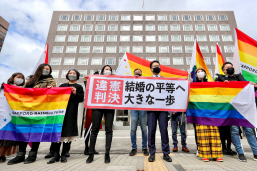Japan’s Ban On Same-Sex Marriage Has Been Found Unconstitutional By A Court
A Japanese district court has ruled that the country’s failure to recognize same-sex marriage is unconstitutional. View this post on Instagram A post shared by Almost Continue Reading [https://www.almostmag.co/japan-same-sex-marriage-ban-unconstitutional/]

A Japanese district court has ruled that the country’s failure to recognize same-sex marriage is unconstitutional.
In Japan, the constitution defines marriage as one of “mutual consent between both sexes,” which has been has commonly been understood as not permitting gay marriage, according to BBC.
The landmark decision on Wednesday by the Sapporo court in the city of Hokkaido, is the first ruling of its kind in Japan on the legality of same-sex marriages, according to the Guardian.
While Japan still remains as the only G7 nation that does not fully recognize same-sex unions, activists say this step is a symbolic victory for the LGBTQ community.
The case was brought forward by three couples in Sapporo, who filed the lawsuit on Valentine’s Day in 2019, along with 10 other couples in Tokyo, Osaka and Nagoya, demanding the right to get married.
The couples argued that the government was violating their constitutional right to equality by banning same-sex marriage.
They demanded one million yen (US$9,000) per person as compensation for services and benefits that married couples are entitled to.
While the Sapporo court rejected their claims, it agreed that the legal benefits of marriage that gay couples are denied from are “discriminatory treatment without a rational basis,” according to the New York Times.
“This is one huge step forward in Japan,” Ai Nakajimia, one of the plaintiffs, said. “We are moving closer to making our dream come true,” the BBC reported.
The Sapporo court is the first to give its verdict, paving the way for other courts around Japan to follow. However, Japan’s LGBTQ community still faces prejudice, and the country has yet to enact a national anti-discrimination law to protect LGBTQ people.
The legalization of same-sex marriages, which requires the enactment by Parliament, also remains an uncertainty.




